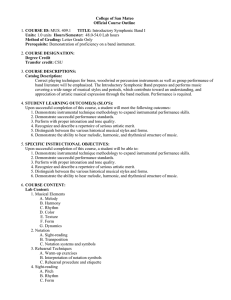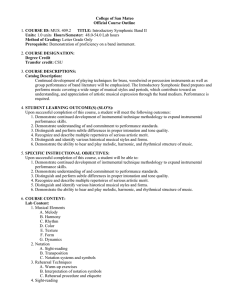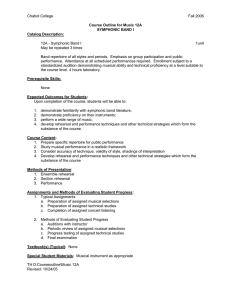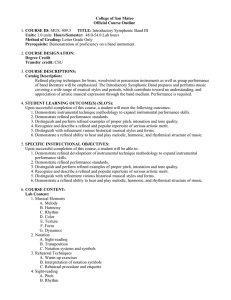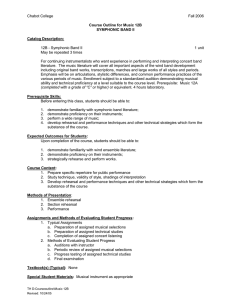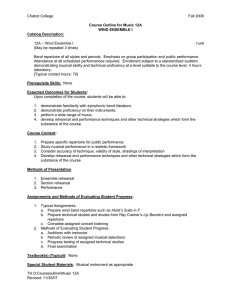College of San Mateo Official Course Outline COURSE ID: Units:
advertisement
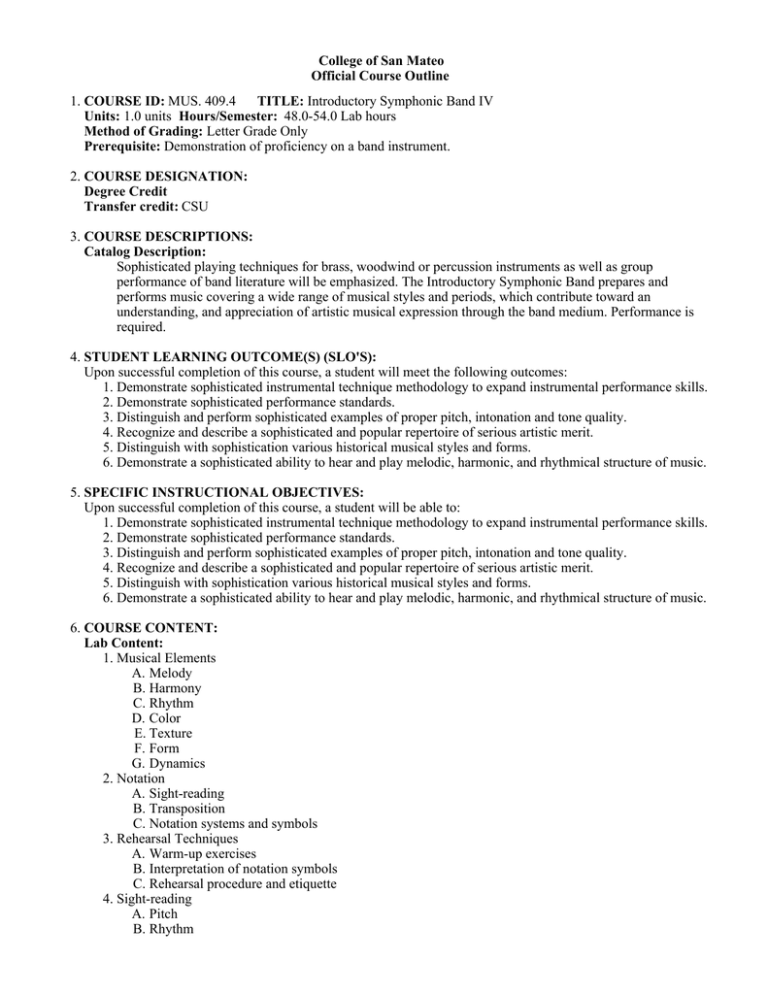
College of San Mateo Official Course Outline 1. COURSE ID: MUS. 409.4 TITLE: Introductory Symphonic Band IV Units: 1.0 units Hours/Semester: 48.0-54.0 Lab hours Method of Grading: Letter Grade Only Prerequisite: Demonstration of proficiency on a band instrument. 2. COURSE DESIGNATION: Degree Credit Transfer credit: CSU 3. COURSE DESCRIPTIONS: Catalog Description: Sophisticated playing techniques for brass, woodwind or percussion instruments as well as group performance of band literature will be emphasized. The Introductory Symphonic Band prepares and performs music covering a wide range of musical styles and periods, which contribute toward an understanding, and appreciation of artistic musical expression through the band medium. Performance is required. 4. STUDENT LEARNING OUTCOME(S) (SLO'S): Upon successful completion of this course, a student will meet the following outcomes: 1. Demonstrate sophisticated instrumental technique methodology to expand instrumental performance skills. 2. Demonstrate sophisticated performance standards. 3. Distinguish and perform sophisticated examples of proper pitch, intonation and tone quality. 4. Recognize and describe a sophisticated and popular repertoire of serious artistic merit. 5. Distinguish with sophistication various historical musical styles and forms. 6. Demonstrate a sophisticated ability to hear and play melodic, harmonic, and rhythmical structure of music. 5. SPECIFIC INSTRUCTIONAL OBJECTIVES: Upon successful completion of this course, a student will be able to: 1. Demonstrate sophisticated instrumental technique methodology to expand instrumental performance skills. 2. Demonstrate sophisticated performance standards. 3. Distinguish and perform sophisticated examples of proper pitch, intonation and tone quality. 4. Recognize and describe a sophisticated and popular repertoire of serious artistic merit. 5. Distinguish with sophistication various historical musical styles and forms. 6. Demonstrate a sophisticated ability to hear and play melodic, harmonic, and rhythmical structure of music. 6. COURSE CONTENT: Lab Content: 1. Musical Elements A. Melody B. Harmony C. Rhythm D. Color E. Texture F. Form G. Dynamics 2. Notation A. Sight-reading B. Transposition C. Notation systems and symbols 3. Rehearsal Techniques A. Warm-up exercises B. Interpretation of notation symbols C. Rehearsal procedure and etiquette 4. Sight-reading A. Pitch B. Rhythm C. Form C. Form D. Interpretation 5. Performance techniques A. Stage decorum B. Performance goals C. Audience appreciation 6. Performance evaluation A. Critique and analysis of group performance B. Self-Analysis of individual performance 7. REPRESENTATIVE METHODS OF INSTRUCTION: Typical methods of instruction may include: A. Lab B. Activity C. Critique D. Guest Speakers E. Observation and Demonstration F. Other (Specify): The primary method of instruction will be the rehearsal and performance of selected compositions appropriate for an Introductory Symphonic Band repertoire. The topics listed in the course content will be taught through the "Comprehensive Musicianship" method through rehearsal and performance. Compositions which emphasize select course content topics will be chosen. Additional methods of instruction will include: (1) individual audition and initial placement by college staff, (2) group and section rehearsals, (3) guest lecturers/conductors. 8. REPRESENTATIVE ASSIGNMENTS Representative assignments in this course may include, but are not limited to the following: Writing Assignments: Short written performance reviews of school and non-school musical performances attended. Other Outside Assignments: Out of class assignments will include (1) practicing weekly assigned exercises, rhythms and techniques and (2) listening to a variety of symphonic and other instrumental music. 9. REPRESENTATIVE METHODS OF EVALUATION Representative methods of evaluation may include: A. Class Participation B. Class Performance C. Final Performance D. Final Public Performance E. 1. Individual auditions/ evaluations with instructor at the beginning and end of each semester to assess student progress. 2. Group and individual performance of assigned technical studies. 3. Aural evaluation of performances through recordings. 10. REPRESENTATIVE TEXT(S): Possible textbooks include: A. Beethoven, L. Complete Music for Wind Ensemble Paperback, ed. Dover Publications, 2014 Other: A. Instructor supplied handouts. B. Sheet music of compositions for performance. Origination Date: February 2014 Curriculum Committee Approval Date: February 2015 Effective Term: Fall 2015 Course Originator: Kevin Henson
